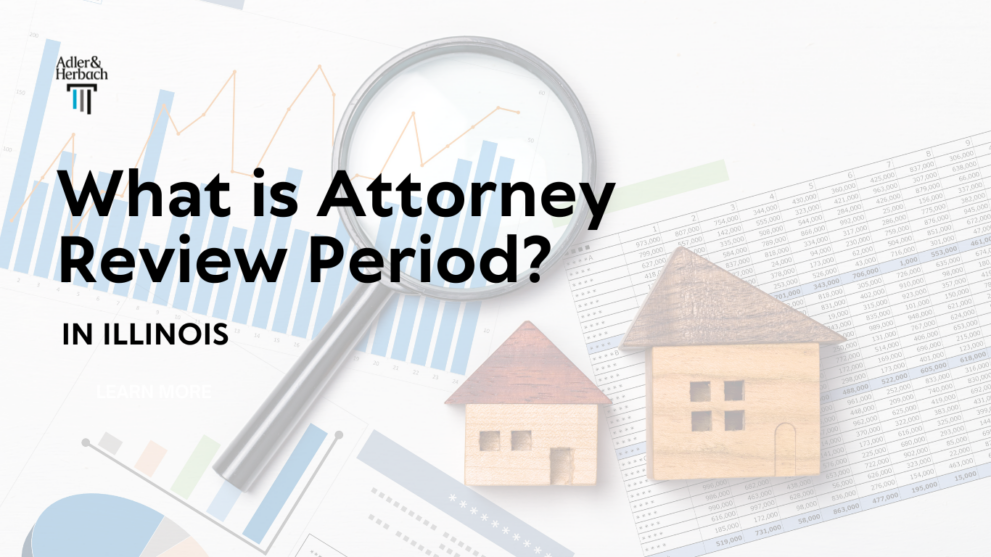What is attorney review period in Illinois? (Real Estate)
The attorney review period in Illinois real estate is a critical 5 business day window following a signed purchase contract. It enables the lawyers for both buyer and seller to review all terms in detail. The attorneys identify any areas of concern, communicate with each other, and negotiate mutually agreeable modifications to the contract language. This review helps avoid future disputes.
If either the home buyer or seller cancels the contract during this attorney review period, all earnest money is refunded, and they are released from further obligation.

When does attorney review period begin?
The attorney review period begins after the buyer and seller have agreed upon the initial terms of the real estate contract.
How long does the real estate attorney review take?
The attorney review period usually lasts 5 business days, during which either party can cancel the contract without penalty.

For Buyers
Understand the importance of attorney review in Illinois.
Our real estate attorneys safeguard your interests, effectively negotiate on your behalf, and ensure legal compliance.

For Sellers
Confidently navigate the attorney review period.
Our real estate attorneys protect your interests, streamline negotiations, and ensure compliance with legal requirements.
Call now & Get a Free Consultation!
Special Offer: Mention this website and get a free consultation on your first service!
What happens during the attorney review period?
During the attorney review period, attorneys of both the buyer and seller can approve, reject, or propose modifications to the contract. They will also ensure all necessary signatures and disclosures have been completed. A real estate attorney can declare the contract void if the client chooses to walk away.

Before buyer and seller sign the contract, they should check the contract and/or confirm with their real estate agent that an attorney review period is provided. The contract terms, such as the purchase price and closing date, are technically not subject to modification under attorney review.
But if a home inspector or appraiser finds something wrong or there are terms that affect the parties’ legal rights, an attorney can use that as a reason to negotiate or terminate the contract, if necessary.
Home Buyer’s Essential Guide
Get the Secrets to a Smooth Home Buying Experience!

Expert-Curated Guide:
- 43-page, mobile-friendly guide for first-time home buyers.
- Covers all aspects from mortgage acquisition to home settlement.
- Touted as the only needed guide for homebuyers.
- Widely praised by locals.
Step 1: Preparation
To do their job effectively, attorneys must gather detailed information about their client’s needs at the start of the attorney review period. This is because standard contract terms may not meet the requirements of every deal.
For example,
- A post-closing possession agreement may be proposed if a seller needs to stay in the house after the closing date.
Attorneys also need to ensure that standard contract provisions, such as the proration rate for real estate taxes, are in their client’s best interest.
Step 2: Review of Documents
1. Purchase and sale agreement review
Attorneys check the contract for errors and ensure the seller provided all necessary disclosures. Both parties’ lawyers prioritize their clients’ needs.
2. Title documents review
Attorneys will review title documents, such as the title commitment and search package, to identify any issues with the seller’s ownership of the property that could create problems with the sale or that need to be resolved before closing.

3. Mortgage Contingency Review
A mortgage contingency clause allows the buyer to cancel a home purchase if they fail to obtain financing within a specific period of time. During the attorney review period, both the buyer and seller should pay attention to this clause.
If the buyer fails to obtain financing within the specified timeframe, they can cancel the contract and get their deposit back.
However, if the buyer misses the deadline for financing and does not cancel the contract, they may lose their deposit.
Find Your Home’s Maximum Value with Our Essential Seller’s Guide!
Tailored exclusively for home sellers seeking to navigate the market with confidence and secure the best possible deal.

- Top 12 Estimators Unveiled: Cut through the clutter with a curated comparison, empowering you to choose the right tool without hassle.
- Clear, Actionable Insights: Simplified breakdowns translate complex tools into actionable knowledge, accelerating your journey to the right price.
- Strategic Pricing Mastery: Master the art of pricing, ensuring your home stands out to buyers while maximizing your profit.
- Tested and Proven Advice: Benefit from real-world assessments and proven strategies that streamline your sale, from listing to closing.
- Trusted by Your Neighbors: Join a community of local homeowners who’ve turned insights into action and success.
- The Key to a Lucrative Sale: Equip yourself with insider knowledge that transforms the selling process, ensuring you walk away with more.
Step 3: Types of Issues Addressed
1. Title Issues
Attorney reviews title search to ensure deed can be transferred without any complications, such as if a former spouse’s name is still on the deed or if there are liens on the property. Any issues are assessed and fixed if possible.
2. Zoning Regulations and Easements
Research must also be conducted on any governmental regulations and restrictions that affect the property, which may impact the buyer’s current or future plans. Minor restrictions or easements, such as telephone wires that cross the property, also need to be analyzed. While not all issues will necessarily impact the real estate transaction, the buyer must be made aware of them before the sale goes through.
3. Financing Terms
The buyer’s pre-approval for a mortgage doesn’t guarantee they’ll get a loan. The terms of the mortgage contingency are finalized during attorney review to determine how much time the buyer has to secure financing and on what terms.

Step 4: Home Inspection
A. Benefits of Home Inspection
A home inspection is typically conducted concurrently with the attorney review period, allowing buyers to identify any necessary repairs and establish a fair price.
1. Identifying Necessary Repairs:
Hiring a home inspector provides peace of mind to first-time buyers by systematically reviewing the property’s condition and identifying any potential issues, such as whether the roof is going to leak at the first sign of rain, or if the A/C won’t work come summer. The home inspector takes a couple of hours to systematically review the house and create a comprehensive report on the findings.
2. Establishing Fair Price
Armed with the inspection report, buyers can request repairs or a credit from the seller at closing to account for necessary repairs. Major issues discovered during the inspection can also be used to renegotiate the price or negotiate a credit from the seller.
B. Home Inspection Process
1. Find a Qualified Inspector:
Ask your real estate professional for a recommendation, or search for local inspectors on sites like Thumbtack.
2. Schedule the Inspection:
Get the inspection done as soon as possible to identify any potential risks associated with the property.
3. Review the Inspection Report:
The report is a thorough assessment of the property that can reveal various issues. If the house is a couple of decades old, it’s common to find that the plumbing, electrical, or gas systems are outdated, and they may need to be replaced for safety reasons.
4. Negotiate Repairs:
Work with your lawyer to determine if any repairs should be requested from the seller or if credit should be issued for the buyer to complete repairs after closing.
C. Waiver of Home Inspection Contingency
In some cases, buyers will waive their right to a home inspection to make their offer more enticing. Remember that you can waive your right to request credits from the seller for issues uncovered by the inspection without waiving the right to have an inspection altogether. This serves the purpose of making your offer more attractive, while still providing you the benefit of discovering any serious issues with the property that need to be addressed.

Step 5: Negotiations
1. Buyer Requesting Repairs
If major issues are found during the home inspection, such as problems with the foundation, plumbing, pests, mold, or electrical, the buyer can request repairs to be completed before closing. Keep in mind that requests for minor items might not get a positive response.
2. Seller Refusing to Make Repairs
If the seller refuses to acquiesce to the buyer’s requests for repairs, the buyer’s attorney can negotiate for credit so that the buyer can make the repairs after the closing. If the seller rejects this possibility, the buyer must decide if it’s worth proceeding.
Step 6: Finalizing the Documents
Once the above negotiations have been finalized, the attorneys must modify the real estate contract to reflect what’s been agreed upon. This modification usually takes the form of an addendum to the contract or an attorney review letter that’s signed by both parties.
Can a seller accept another offer during attorney review?
A seller may not accept another offer during the attorney review period unless the real estate contract has a kick-out clause, which explicitly allows them to accept another offer prior to the satisfaction of all contingencies.
Absent such a clause, sellers cannot legally solicit, negotiate, or accept a new offer from another buyer during the attorney review period or while the property is under contract. Doing so is an ethical violation and likely a breach of the sales contract.
What can go wrong during the Attorney Review period?

Things that can go wrong during the attorney review period are:
- Extension requests for home inspections
- Renegotiations over contract terms due to discoveries
- Cancellation of the sales contract
- Discovery of title issues or property liens
- Issues with property disclosures
- Unresolved repairs from home inspections
- Buyer’s financing difficulties
- Changes in parties’ financial or personal circumstances
- Zoning compliance problems
- Challenges in obtaining necessary permits
- Disputes between buyer and seller
- Delays due to government approvals or certifications.
These potential challenges highlight the need for experienced real estate attorneys to navigate the process.
6 Benefits of Real estate Attorney Review

1. Avoiding Costly Mistakes
The biggest benefit you can get by consulting an expert is saving money. While it may seem like paying for a real estate attorney is an additional cost, having an expert in your corner who understands the contract’s essential terms and has experience in the area could ultimately save you on factors you might have overlooked on your own.
Call now & Get a Free Consultation!
Special Offer: Mention this website (Northsidelegal.com) and get a free consultation on your first Real estate attorney service!
2. Enhancing Negotiations
When experienced lawyers review a real estate contract, they understand where there might be room for negotiation. While the purchase price might not change (unless there’s a major discovery during inspection), there are other areas where the buyer and seller might have room to negotiate.
3. Reducing Risk: Prevention of Unforeseen Issues
Experience is the name of the game when it comes to foreseeing potential issues. If an attorney disapproves of any of the seller’s stipulations or suspects that there is malicious intent, he or she might have suggested revisions to the contract before proceeding.
4. Protecting Buyers
A buyer’s priorities are to uncover any hidden pitfalls that might arise in the future. The buyer wants to be aware of any shortcomings on the property and whether they’re worth the risk of ownership. The attorney review period allows a deep dive into the nitty-gritty of the property’s history, which protects the buyer from future issues.
5. Protecting Sellers
A seller’s priorities are, first and foremost, to get the most value out of their property. While there might be other sentimental reasons why they do or don’t sell to a particular buyer, the bottom line matters most. The seller’s attorney helps address any complaints the buyer might have during this period and protects the seller from underselling their home.
6. Ensuring Compliance with Laws and Regulations – Access to Expert Legal Advice
While most contracts can feel impenetrable, your attorney should help translate the legalese into plain language. This ensures that you understand any laws pertaining to the property and are not accidentally violating any regulations.

What happens after the attorney review period?
After the attorney review, a home inspection is performed, and any necessary repairs are negotiated. The buyer’s attorney sends an approval letter, and both parties review and sign the final contract. Buyer pays earnest money, which will be kept in escrow until closing.
The title company handles the title search and title insurance processes. If financing is involved, a mortgage commitment is obtained from the lender.
Finally, the closing takes place where final documents are signed, the remainder of the purchase price is paid, and ownership is transferred from the seller to the buyer.
What can go wrong after the attorney review period?
After the attorney review period, several issues can derail a home sale. These include buyer financing problems, unexpected issues discovered during inspection, title defects, an appraisal value lower than the purchase price, and failure to reach agreement on contract terms and contingencies.
If parties cannot agree on essential aspects like price, repairs, or contingencies, the transaction may be at risk. Open communication and compromise are crucial to resolving these potential hurdles.
Conclusion
While purchasing or selling a home might feel overwhelming, having an attorney to guide you through your real estate transaction will help put your mind at ease. During the attorney review period, the lawyers are doing what you pay them to do: make sure the real estate contract reflects your best interests before you reach the closing.
This includes ensuring that the property is in reasonable condition and complies with government regulations, that the contract is completed properly, its terms are reasonable and agreed upon by all parties, and that the buyer and seller are protected from future problems.
Final Thoughts
Given that real estate contracts in Illinois are routinely executed without much attention to detail, the attorney review clause is vital to ensure that the lawyers have an opportunity to amend the terms so that the buyer’s and seller’s interests are truly protected.
Adler & Herbach is proud to service Chicagoland real estate closings for both buyers and sellers. For more information, please call us at (847) 318-3770 or fill out our web form here.

